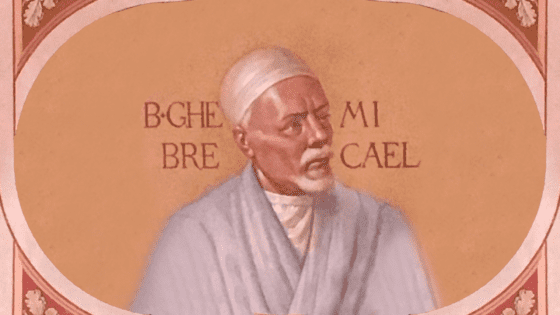On October 3, 1926, Pope Pius XI, called the Pope of the Missions, beatified Ghebre Michael. Up to the present time he is the first African Vincentian Missionary whose holiness has been officially recognized and affirmed.
Ghebre Michael: a tireless seeker of truth:
born as a Coptic Christian, he left his home and entered the monastic life. After his formation and religious profession, he toured (with the permission of his superiors) the libraries and monasteries of Ethiopia. During that time, he sought the authentic person of Christ and also sought Christ’s true church. Only when he became certain of the sound doctrine of the Catholic Church did he find peace. Making a clear and determined option for the Church, he found the serenity and tranquility that he sought for many decades. When he made that decision, the contempt of his family and the mockery of his friends had no influence on him. Indeed, he was willing to endure persecution (Romans 8:35-39) in order to obtain the priceless jewel, Jesus Christ and his Church (Matthew 13:44-46).
Ghebre Michael: a docile disciple to the voice of the Master:
Justin de Jacobis was not satisfied with receiving Ghebre Michael into the Catholic Church … rather he decided to accompany him and to guide him. In the words of Pope Francis, De Jacobis was a pastor who had the smell of the sheep. Justin was a companion on the journey … one who like Paul the Apostle, proclaimed the word and was persistent whether it was convenient or inconvenient and convinced, reprimanded and encouraged through all patience and teaching (2 Timothy 4:2). De Jacobis formed Ghebre Michael through the example of his presence.
De Jacobis was assertive with regard to the formation of Ghebre Michael and on January 1, 1851 Ghebre Michael was ordained. With reason Justin stated: who is more worthy of sacred orders? I feel blessed that I advocated for his elevation to the priesthood.
Ghebre Michael: from a diocesan priest to a Vincentian missionary:
from the time of Vincent de Paul, the ministry of vocational promotion has been one of witness. Nevertheless, there have been members of the Congregation who have directly invited an individual to join the community. In the first instance, it can be stated that Justin de Jacobis gave witness to Ghebre Michael. As a result, Ghebre Michael left the ranks of the diocesan clergy and became a member of the Little Company.
When Justin communicated the tragic death-martyrdom to the superior-general (June 29, 1858 —three years after the event), Justin de Jacobis stated: To this picture of the Abyssinian martyr, Ghebre Michael, I have added an inscription in Latin in which I refer to him as a Vincentian seminarist. In fact, he was only a postulant because the time of his vocation could be counted only from the moment when he would have begun his intern seminary; by the date which had been arranged he was already in prison; however, in his heart, he already belonged to the Congregation.
At the conclusion of this reflection, I pose the following question: why, in recent times, have not diocesan priests like Ghebre Michael, Janez Frančišek Gnidovec and Manuel Requejo? Is our zeal and/or our dedication not attractive? Something for you and I to reflect upon and to pray about.
By: Marlio Nasayó Lievano, CM
Province of Colombia
_______________
Translator’s Note: the author cites these words as those of Vincent de Paul, but I was unable to find these words in the English edition of the Correspondence, Conferences and Documents.


